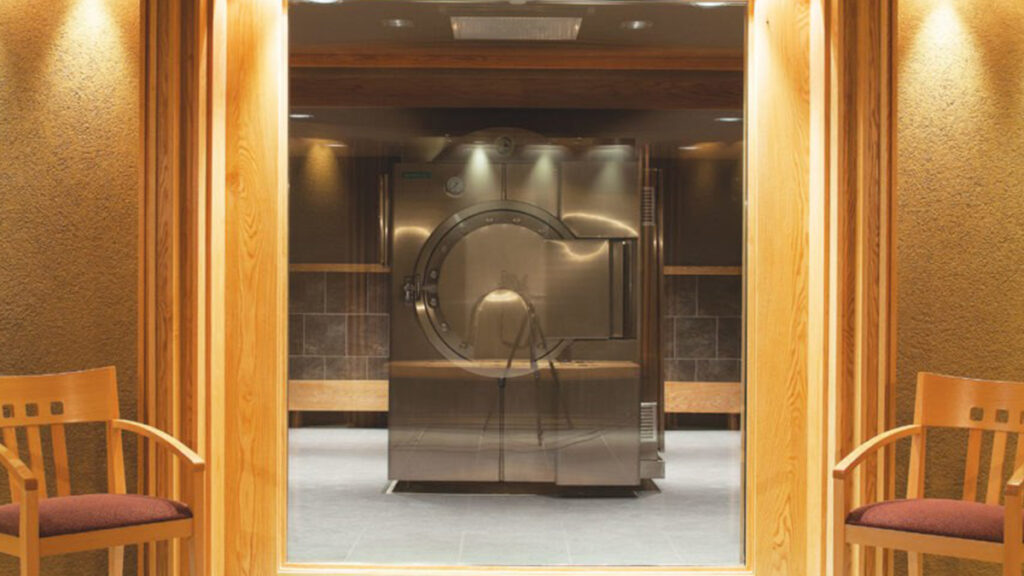Alkaline hydrolysis, water cremation, bio cremation, resomation, green cremation, flameless cremation, or aquamation. It all refers to an alternative water based and Eco-friendly cremation option for consumers.
A third option
While they are standard and accepted options today, cremation by fire or being buried doesn’t always sit right with guests looking to make a selection. Enter aquamation, a peaceful water based cremation that can help create a new more Eco-friendly option for a demographic who hasn’t felt comfortable with the options available to them in the past
How does Alkaline Hydrolysis work?
The departed is placed into a pressurized metal drum and once the door is sealed the machine weighs the body adds the appropriate amount of water and potassium hydroxide (pH). The drum is heated to 350℉ (175℃) and the combination of a gentle water flow, temperature, and alkalinity accelerate the breakdown of organic materials. After three hours the process is finished and the machine is opened to reveal, similar to fire cremation, bone remnants as well as liquified remains, which no longer obtain any DNA and is safe for standard disposal, the same as embalming. An easy way to explain it is through this ‘Inthelighturns’ metaphor “Imagine an ice cube melting in a glass of water. Surrounded by a warmer liquid, the solid ice gradually disappears.”
Death care industry investment opportunities
This new process could be another great eco friendly option for funeral homes to offer guests, however as the process is still new for human disposition it also comes with a new tech price tag, starting at $150,000 (€134,524) and goes up depending on the size and pressure capacity of the machine. This means that for the investment to make sense it needs to attract new clients rather than just converting guests who are already interested in a cremation, since the machinery is already available.
The cost of the Alkaline Hydrolysis will be the same to consumers as traditional cremation, however, if the gentler method and the Eco-friendly benefits of the process help attract demand, it can provide ammunition for operators to make the investments. Water cremation has been proven to be less harmful for the environment as it doesn’t use any fossil fuels, but it does use water, so depending on where the facility is located that can also be seen as an important resource.
One group that is quickly breaking down barriers for Alkaline Hydrolysis are veterinarians and pet owners, who are embracing the new Eco-friendly pet cremation format. The barrier to enter the pet death care market is also lower than is human counterpart because while the aquamation machine costs $160,000 (€143,537), it can process 4,000 pounds of remains, meaning multiple medium to smaller animals can be processed at once. The deceased pets are placed in separate satchels so pet owners can be sure to get just the remains of their own deceased ̈fur baby ̈.
For animal use the process isn’t facing the same legal difficulties as it is with the human process. Resomation for agricultural animals has already been approved in many places for years and the machines for pets operate at around 200 degrees (94°C) Fahrenheit, so the regulatory red tape is relatively easier to navigate. Plus there is no public protest on the process for pets.
Officially there are no reported pet death care figures about how many animals are buried or cremated. There is an estimated 78 million dogs and 85.8 million cats currently owned in the United States though. Meaning there is a large and growing demand for respectfully managing pets who have passed on.
The future of Alkaline Hydrolysis
It is not new that the public takes time to adapt to new ways of managing death. However, the development of new methodologies to manage body disposition help open the conversation and create opportunities for people to make a body disposition choice they feel content with.
The process of Alkaline Hydrolysis for humans is currently legal in 17 US states, Australia, Mexico and is being conducted in the UK despite there being no official yes or no declared, as of yet. However, there is a barrier the process faces in order to continue growing, and it is the negative connotation around disposing the liquidated remnants. There is a public concern about the safety of disposal, mainly due to lack of education. It is an even bigger issue because resomation has been condemned by the catholic church, who have actively interfered with the water cremations becoming available in a few US states. As they deem that the process violates the dignity of the deceased. However, if an alternative can be derived on how to more “respectfully” handle the liquid remains in the eyes of the church this process could find its way back into the good graces.
Along with other new death care body deposition processes, that sustainability focused, such as recomposition or green burials it ́s allowing the industry more opportunities to offer customization to clients.
